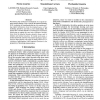Free Online Productivity Tools
i2Speak
i2Symbol
i2OCR
iTex2Img
iWeb2Print
iWeb2Shot
i2Type
iPdf2Split
iPdf2Merge
i2Bopomofo
i2Arabic
i2Style
i2Image
i2PDF
iLatex2Rtf
Sci2ools
122
click to vote
AAAI
1994
1994
Formalizing Ontological Commitment
Formalizing the ontological commitment of a logical language means offering a way to specify the intended meaning of its vocabulary by constraining the set of its models, giving explicit information about the intended nature of the modelling primitives and their a priori relationships. We present here a formal definition of ontological commitment which aims to capture the very basic ontological assumptions about the intended domain, related to issues such as identity and internal structure. To tackle such issues, a modal framework endowed with mereo-topological primitives has been adopted. The paper is mostly based on a revisitation of philosophical (and linguistic) literature in the perspective of knowledge representation.
AAAI 1994 | Basic Ontological Assumptions | Intelligent Agents | Intended Meaning | Ontological Commitment |
Related Content
| Added | 02 Nov 2010 |
| Updated | 02 Nov 2010 |
| Type | Conference |
| Year | 1994 |
| Where | AAAI |
| Authors | Nicola Guarino, Massimiliano Carrara, Pierdaniele Giaretta |
Comments (0)

